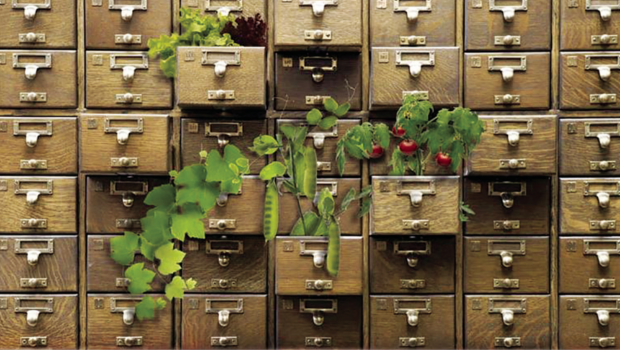How seed libraries are fighting against agricultural giants to increase genetic diversity in our crops and build a more resilient food supply.
by Mark Schapiro
Break open a seed and you unravel a genetic story. Inside every seed is a  narrative told by chromosomes, a tale that reveals how the plant absorbs nutrients and responds to threats from pests and weeds and to changes in climate and weather.
narrative told by chromosomes, a tale that reveals how the plant absorbs nutrients and responds to threats from pests and weeds and to changes in climate and weather.
Inside every seed library—and there are more than 400 of them now—is another tale. Here are seeds that have been locally cultivated, saved and passed along from farmer to farmer. They are repositories of genetic information that have been quietly spreading across America during the last decade. They tell the story of how, at a time of unprecedented climatic stress on our food supply, people are fighting to expand their range of crop choices to respond to changing climate conditions.
As one company after another is purchased by the giants that now dominate the seed trade—most notably Monsanto-Bayer, DuPont-Pioneer and Syngenta, which together have purchased hundreds of locally based seed companies over the past 20 years—the libraries are defying efforts to homogenize the seeds.
The United States Department of Agriculture points to climate change as a significantly disruptive force on America’s capacity to grow food, and recommends a more diverse array of crops as a major step toward developing greater resiliency. At the same time, numerous studies (including a major 30-year side-by-side comparison of the yields from organic versus conventional agriculture) suggest that farm fields with greater diversity are just as productive as the mono-cropped farms that rely on heavy applications of agricultural chemicals, and they come with far less collateral damage to the environment and public health.
As the industry consolidates, seed libraries are emerging like a parallel universe, offering local varieties for farmers and gardeners to test out, replant and evaluate for other local users. Many are hosted by public lending libraries—adding a new sort of story to the many already on the shelves. The seeds are often housed in small packets inside old-fashioned card catalogs rescued from storage bins when libraries went digital. These small-scale seed sanctuaries are at the forefront of efforts to sustain and nourish a diverse seed supply. The libraries operate according to basic farmer principles, almost nostalgic by now: Those who test the seeds out in their fields are expected to return the following season with a sampling of the results and notes on their performance that might be helpful to the next user.
While there are abundant studies about the importance of diversity to a thriving agriculture, there are few about the relatively recent role of seed libraries. One of those, in the Journal of Environmental Studies and Sciences by Nurcan Helicke, an assistant professor of environmental studies and sciences at Skidmore College, suggests that the libraries and other forms of open seed-sharing enhance farmers’ knowledge of seeds’ performance in local conditions and provide a hedge against the loss of precious genetic information to a homogenizing industry.
“Seed libraries and seed exchanges may be the most important thing we’re doing for agriculture in the 21st century,” says Bill McDorman, director of the Rocky Mountain Seed Alliance, which has been working with farmers and gardeners in the mountain states to find and breed the grains and vegetables that have practically disappeared under the pressure of large-scale commodity farms.
In the enormous picture of U.S. agriculture, these are all relatively small initiatives. But they are the kernel of an effort to stimulate and sustain the wide genetic spectrum that is critical to a resilient food system. “Hopefully we’ll have preserved enough diversity,” says Rebecca Newburn, in Richmond, California, “to save us when the [current]system no longer works.”
Mark Schapiro is an investigative journalist specializing in the intersection between science, politics and power. His most recent book is Seeds of Resistance: The Struggle for Our Food. He will be speaking at The Real Truth About Health Conference, which will be held Feb. 2-11 at the Long Island Hilton, in Melville (RealTruthTalks.com).





